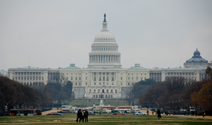
How to be "balanced" about Nazis. Yeah, sure they did some bad things, but you have to remember that there are two sides to every story....
Even the government was shamed by this one. The Joint Committee on the Conduct of the War concluded: Whatever influence this may have had upon Colonel Chivington, the truth is that he surprised and murdered, in cold blood, the unsuspecting men, women, and children on Sand Creek, who had every reason to believe they were under the protection of the United States authorities, and then returned to Denver and boasted of the brave deed he and the men under his command had performed.
"...to admiring crowds..."
Sometimes people who read about events like the Sand Creek Massacre become passionate about the injustice they have read about and make overly broad generalizations about American history that make it easy for jerks like James Dobson to assert that such commentary only comes from the "fringe" and that America is fundamentally a good nation that consistently -- until "Leave it to Beaver" got cancelled -- seeks to do the will of God.
This is the story about an act of terrorism committed by our noble forefathers, by soldiers under the direction of their commanders, of whom one, that we know of, refused his orders.
This is a classic template for the treatment of native peoples by the U.S. government. A treaty is negotiated in which the native peoples concede vast quantities of valuable land to the white settlers and move off to a new reservation on lands the whites consider worthless and undesirable. Then something of value-- gold, in this case-- is discovered on the reservations, and a new treaty is "negotiated". In this case, the Cheyenne were generously offered a new reservation 1/13th the size of the land they were given originally, and slightly out of the way of the stampeding settlers headed for the gold rush.
Some militants among the Cheyenne thought they had been tricked and cheated. That seems a reasonable assumption. Nevertheless, some native leaders felt they had no choice but to accept the new treaty-- or be massacred. In this instance, it didn't matter. Shortly after the new treaty was signed, on November 29, 1864, the Colorado Militia attacked an undefended encampment and slaughtered 150-200 old men, women, and children. Many of the soldiers committed rapes and atrocities.
Some of them took genitals and scalps for souvenirs, which they proudly displayed to admiring crowds in Denver.
"to admiring crowds..." Is the average American complicit, in any way, with the genocide that was the basis of the rapid expansion of the American frontier in the 19th century? What about those "admiring crowds"-- masses of people who clearly approved and encouraged the slaughter though most of them never lifted a finger, personally, against native peoples. They admired. They received the murderers kindly. They embraced them morally and literally. Just as the citizens who forgave William Calley thereby revealed their complicity in the Viet Nam atrocities.
I personally haven't read any American history books lately-- and I'm curious about whether they pay any attention to stories like this. They would be wise to. If you find out about these things when you are older, you almost have to come to the conclusion that your parents and teachers and government have been deceiving you all along-- maybe those big tax breaks for oil companies don't make sense after all....
Copyright © 2008 Bill Van Dyk All rights reserved.
